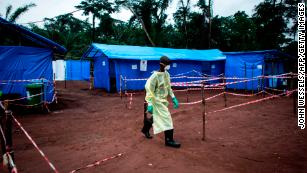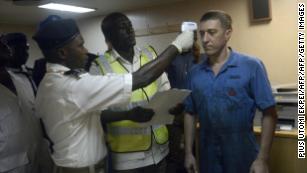WHO preparing for worst-case Ebola scenario
(CWN)The
World Health Organization is preparing for the "worst-case scenario" as
it continues to respond to the Ebola outbreak in the Democratic
Republic of Congo.
Peter Salama, deputy director-general of emergency preparedness and response at the WHO, said in Geneva, Switzerland, on Friday that it's "going to be tough and it's going to be costly to stamp out this outbreak."
There
have been 34 cases of Ebola virus disease reported during the past five
weeks, the WHO said Friday. Of those, two have been confirmed using
laboratory tests, 14 are suspected, and 18 -- who are deceased -- are
considered probable for the disease.
Three of the patients are health
care workers.
"The
number of suspected, probable and confirmed cases is significant, so we
are very concerned, and we are planning for all scenarios, including
the worst-case scenario," Salama said.
Ebola
virus disease, which most commonly affects people and nonhuman primates
such as monkeys, gorillas and chimpanzees, is caused by one of five
Ebola viruses. On average, about 50% of people who become ill with Ebola
die.
The disease is endemic to the Democratic Republic of Congo, and this is the nation's ninth outbreak since the
The latest outbreak is occurring in the
Bikoro health zone, 400 kilometers (about 250 miles) from Mbandaka, the
capital of Equateur province.
Bikoro
health zone has a population of about 163,000, with three hospitals and
19 health centers, most with limited functionality, according to the WHO.
Given
the remote location of the outbreak, Salama said, response efforts will
be extremely challenging. "It is a dire scene in terms of
infrastructure," he said.
"To give
you a sense, we are talking about an area that is 280 kilometers even
from the provincial capital of Equateur," he said.
The
WHO is working with authorities in Congo and is in discussions with the
World Food Programme to arrange airlifting supplies to the affected
areas.
UNICEF is also making doctors available as well as sanitation and
hygiene specialists to help contain the outbreak.
The virus is transmitted to
people from wild animals and spreads in the human population through
human-to-human transmission, either through direct contact with bodily
fluids such as blood or secretions or contact with materials that are
contaminated with these liquids.
Personal
protective equipment, body bags, boxes for transportation and
interagency emergency health kits will all be sent to the affected
region Saturday, the WHO said. Two mobile laboratories will also be
deployed.
Médecins Sans Frontières
is setting up four five-bed mobile isolation units to increase the
hospital bed capacity in Bikoro, which is currently 15 beds, according
to the WHO.
Initial control efforts are focusing on tools such as surveillance and monitoring, safe burials and case management.
Vaccines along with doctors and epidemiologists are on standby in case they are needed, according to the UN.











Post a Comment